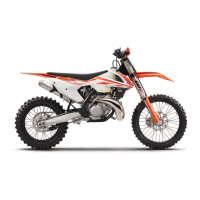3 WORK
16
3.11 Refueling
Danger
Fire hazard Fuel is highly flammable.
The fuel in the fuel tank expands when warm and can escape if overfilled.
– Do not refuel the vehicle in the vicinity of open flames or lit cigarettes.
– Switch off the engine for refueling.
– Make sure that no fuel is spilled; particularly not on hot parts of the vehicle.
– If any fuel is spilled, wipe it off immediately.
– Observe the specifications for refueling.
Warning
Danger of poisoning Fuel is poisonous and a health hazard.
– Avoid skin, eye and clothing contact with fuel.
– Immediately consult a doctor if you swallow fuel.
– Do not inhale fuel vapors.
– In case of skin contact, rinse the affected area with plenty of water.
– Rinse the eyes thoroughly with water, and consult a doctor in case of fuel contact with the eyes.
– Change your clothing in case of fuel spills on them.
Warning
Environmental hazard Improper handling of fuel is a danger to the environment.
– Do not allow fuel to enter the groundwater, the soil, or the sewage system.
– Switch off the engine.
– Open the filler cap. ( p. 17)
400382-10
–
Fill the fuel tank with fuel up to measurement
A
.
Guideline
Measurement of
A
35 mm (1.38 in)
Total fuel tank
capacity, approx. (All
SX models)
7 l
(1.8 US gal)
Super unleaded
(95 octane) mixed
with 2-stroke
engine oil (1:60)
( p. 21)
Total fuel tank
capacity, approx. (All
XC models)
10 l
(2.6 US gal)
Super unleaded
(95 octane) mixed
with 2-stroke
engine oil (1:60)
( p. 21)
Engine oil, 2-stroke ( p. 21)
– Close the filler cap. ( p. 18)

